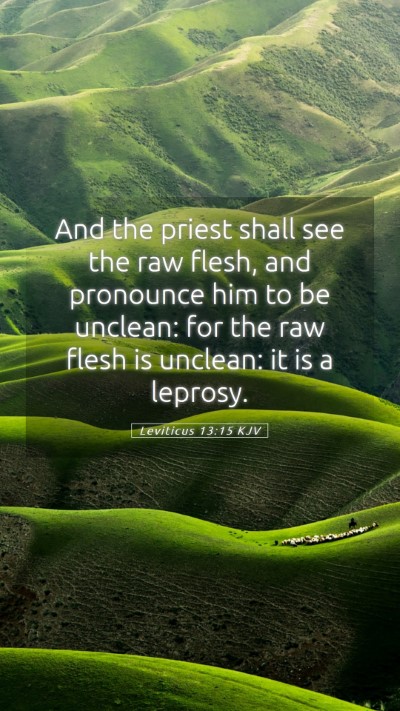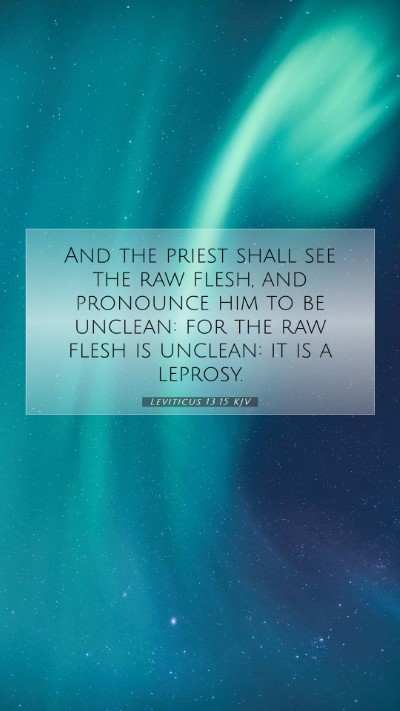Understanding Leviticus 13:15
Verse: Leviticus 13:15
Context: The Book of Leviticus outlines the laws and regulations for the Israelites, emphasizing purity, holiness, and the proper conduct required of God’s chosen people. Chapter 13 specifically deals with the laws regarding infectious skin diseases, often translated as leprosy, which required meticulous inspection by the priests.
Verse Meaning and Commentary
Leviticus 13:15 states: "And the priest shall look upon the skin of the flesh, and when the hair in the plague is turned white, and the plague in sight be deeper than the skin of his flesh, it is a plague of leprosy: and the priest shall look on him, and pronounce him unclean."
Analysis and Insights
This verse illustrates the role of the priest as an authority figure in assessing the condition of individuals afflicted with skin diseases. Observing the depth and characteristics of the plague required both spiritual discernment and practical understanding of the visible symptoms.
- Authority of the Priest: According to Matthew Henry, the priest serves as a mediator of God's law. His inspection symbolizes a divine examination of the heart and outward appearance, reminding the faithful of the importance of both inner purity and community standards.
- Symbolism of White Hair: The change in color of the hair signifies the severity of the affliction. Albert Barnes suggests that white is often associated with death or decay, indicating serious spiritual implications as well.
- Spiritual Implications: Adam Clarke emphasizes that these physical ailments are indicative of spiritual conditions. The deeper the plague penetrates the skin, the more it symbolizes a heart that has been stained by sin.
- Community Health: The public health measures outlined in this verse ensured that those who were unclean were identified and separated, reducing the risk of contagion. This was crucial for the physical health of the Israelite camp.
- Ongoing Examination: It was not a one-time assessment. The continual evaluation by the priest demonstrates God's ongoing concern for His people, requiring them to engage in self-reflection and assessment of their spiritual state.
Application of the Verse
The principles found in Leviticus 13:15 can be profoundly relevant today. Here are a few applications to consider:
- Self-Examination: Just as the priest examined skin diseases, individuals today are called to examine their own spiritual condition and the 'plagues' that may exist in their lives.
- Community Responsibility: Reflecting on how our actions affect others highlights the communal aspect of faith. Engaging in Bible study groups can help encourage this communal responsibility.
- Seeking Corrective Action: Understanding the seriousness of spiritual 'illnesses' can lead to proactive repentance and seeking help through prayer and guidance from others.
Cross References
- Leviticus 13:2 - The laws of examining skin diseases
- Numbers 5:2 - Casting out the unclean from the camp
- Deuteronomy 24:8 - Regulations concerning leprosy
Conclusion
Leviticus 13:15 offers rich insights into Biblical teachings on disease, community living, and the importance of spiritual health. Engaging with this scripture through personal reflection or in a Bible study context deepens our understanding of the significance of cleanliness, both physically and spiritually.


